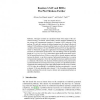Free Online Productivity Tools
i2Speak
i2Symbol
i2OCR
iTex2Img
iWeb2Print
iWeb2Shot
i2Type
iPdf2Split
iPdf2Merge
i2Bopomofo
i2Arabic
i2Style
i2Image
i2PDF
iLatex2Rtf
Sci2ools
110
click to vote
CP
2001
Springer
2001
Springer
Random 3-SAT and BDDs: The Plot Thickens Further
Abstract. This paper contains an experimental study of the impact of the construction strategy of reduced, ordered binary decision diagrams (ROBDDs) on the average-case computational complexity of random 3-SAT, using the CUDD package. We study the variation of median running times for a large collection of random 3-SAT problems as a function of the density as well as the order (number of variables) of the instances. We used ROBDD-based pure SAT-solving algorithms, which we obtained by an aggressive application of existential quantification, augmented by several heuristic optimizations. Our main finding is that our algorithms display an “easy-hard-less-hard” pattern that is quite similar to that observed earlier for search-based solvers. When we start with low-density instances and then increase the density, we go from a region of polynomial running time, to a region of exponential running time, where the exponent first increases and then decreases as a function of the density. T...
| Added | 28 Jul 2010 |
| Updated | 28 Jul 2010 |
| Type | Conference |
| Year | 2001 |
| Where | CP |
| Authors | Alfonso San Miguel Aguirre, Moshe Y. Vardi |
Comments (0)

